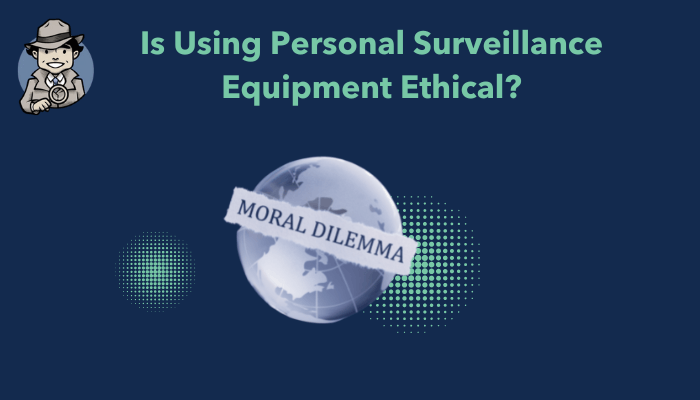Personal surveillance equipment is 100% legal. State laws have some differentiation between types of surveillance equipment, but at its foundation, you're well within your rights to own and use surveillance equipment.
But what about the ethics of surveillance equipment? It might be used with good intentions - like wanting to document workplace harassment, monitor the nanny with your children, and keep an eye out on your home, but it does feel slightly invasive when someone doesn't know they're being recorded.
This piece discusses the ethics of using spy cameras, GPS tracking, audio surveillance, counter-surveillance, and hidden security measures. If you're having second thoughts about purchasing spy gear because it makes you uncomfortable, we hope this article gives you a fair, balanced view of both sides.
Society's Ethics vs. Your Morals
Laws are often created based on ethics - a general standard of right and wrong behavior determined by the community and society. Within these ethics are the moral principles that govern your conduct. Society might deem something wrong while you believe it to be correct.
The Covid mask mandate is an example where individual morals clashed with society's ethics. If using spy equipment is in line with the rules of your local law enforcement, then you shouldn't have to worry about overstepping boundaries.
However, different types of surveillance might bring out different feelings about privacy. Spy cameras feel incredibly invasive, while audio surveillance and location tracking feel slightly more acceptable. Let's look at the different types of surveillance to understand where your morals and ethics stand with them.
The Ethics of Spy Cameras
Spy cameras are legal in all states. There's no consent needed for a camera to roll, and you can install one in your kitchen, dining room, living room, playroom - whichever area of the house you want to monitor. Is it ethical to install a camera in a bathroom or bedroom? No. If you must install a camera there, let them know and get their permission. But really, it's not necessary. It doesn't matter if you're doing it to watch your children or keep someone safe; invading someone's privacy that way is wholly unethical.
Many employers use cameras to monitor their employees. Spy cameras at work are legal as long as the footage has a date and time stamp and isn't tampered with. Although it's a private area that belongs to the owner, employees also have a right to monitor their environment without informing anyone.
The Ethics of Audio Surveillance Equipment
Audio surveillance is a little trickier. 11 states require two-party consent. If you're planning to use the footage as evidence, you must let the person know you're recording the conversation. You can check out the states here.
The intention is taken into consideration too. If you're recording to commit a criminal act, that's completely illegal. If you're recording to prevent a criminal act, you can probably get away without the two-party consent, as long as you prove you had good intentions.
Ethically, we don't see anything wrong with using audio surveillance. More often than not, it's intended to keep an eye out on your family, monitor uncomfortable situations at work, or streamline evidence in divorce proceedings.
The Ethics of GPS Tracking
Recently, a woman posted a story on a Reddit thread about finding AirTags in her car. She was sure her husband had put it there and was looking for advice on what she should do about it. He hadn't informed her, and she felt weird and uncomfortable with it.
Many suggested that it seemed like her husband suspected her of cheating, and it might be better to open up the discussion and find out why rather than jumping to conclusions.
Others suggested that he was having an affair and the AirTags allowed him to monitor when she was on her away home.
Another woman wrote that she suspected her husband of cheating and putting an airbag in his car. She monitored the device and saw that he spent about two hours at an abandoned lot in the early hours of the morning.
Most comments on both posts criticized all parties - the lying spouse and the one who used a tracking device. It's not illegal, so this one does depend on your own beliefs and ideas about privacy. If you suspect your spouse of cheating and are looking for proof to support your theory, then covertly using a location device could give you peace of mind.
If there's another way to open up an honest, productive conversation, then go that route instead. Before inserting a tracking device in your spouse's car, we encourage you to think about how you would feel if they did that to you. Once you overcome that privacy and trust barrier, it's hard to get it back.
It's a different story when you're monitoring your child's car for safety reasons or tracking your car in case it gets stolen. If something happens and you need to involve law enforcement, then the covert location tracker to help the search is useful.
The Ethics of Counter-Surveillance and Bug Detection
Detection tools are designed to pick up when you're being spied upon. They can be advanced FM monitors that pick up on frequencies and show you if the equipment you're unaware of is in your vicinity, or they can be an easy-to-use detector like our Scout Hidden Camera detector. This one is a no-brainer, but we stock bug detections, and they're popular, so we thought it would be best to cover the ethics here too.
Knowing when someone is using surveillance equipment to record you will help you understand what you need to do to ensure your family's security. They're not illegal, and you're within your rights to use them in your home, an Airbnb or hotel room, or even at work. Remember that at work, your employer is allowed to record your activity and conversations without notifying you.
Why Do People Use Spy Equipment?
For fear of sounding too vague or abstract, we'd like to outline the general use of spy equipment so that you may have a complete picture of the morals and ethics in the spy industry. Our customers have been using our equipment ethically for a variety of reasons, with the most frequent ones being:
- Worried parents monitoring the nanny,
- Business people preventing losses,
- Secret shopping,
- Obtaining proof of harassment at a workplace,
- HR investigations,
- Various PI work,
- Small business owners watching their retail stores,
- Private affairs and home use,
- Students who need an extra tool to take notes in college.
Final Words
Technology has its good and bad sides. It moves so fast that our morals and ethics often have trouble keeping up with the changes. Most of us use spy gear to protect our families and keep them safe. We also want adequate evidence if we have to go to the police and involve law enforcement. Spy cameras and audio equipment might not be ideal, but they're our best defense against people who don't have the best intentions.
The bottom line is that even though specific usage of spy equipment might be legal, it isn't always considered ethical, depending on where you live. On the other hand, the illegal use of spy equipment is regarded as immoral, and we strongly advise against it.
Contact Us
SpyGuy has always been committed to the responsible use of spy equipment while staying completely discreet regarding product sales and delivery. Moreover, we always strive to put a device in your hands that's best suited for your individual needs. On top of that, we offer free ground shipping, a 1-year warranty, and lifetime tech support for all our products.
Should you have anything to add to our take on morals and ethics in the spy industry, or if you have any questions regarding our products, don't hesitate to contact us - send us an email or call directly.



